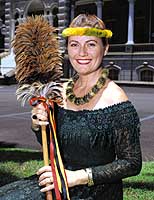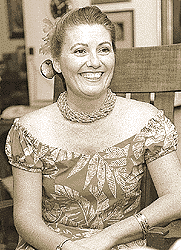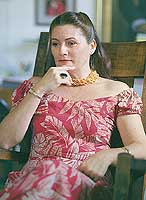Battle Royal
|
August 7-13, 1998 As a first-grader at Makaha Elementary School in the late 1950s, Owana Salazar came home one day excited over the prospect of a school vacation. "Mommy!" she said, "There's no school
tomorrow." Helena Kalokuokamaile Keoua Wilcox Salazar quickly corrected her daughter: "Hawaii's first Delegate-to-Congress was Robert Wilcox, your great grandfather." "I couldn't wait to get to school to tell everyone the truth," Owana remembers. "In 'show-and-tell' I stood up in front of my classmates and told them that my great grandfather, not Kuhio, was the first Delegate-to-Congress. I don't think I made the teacher very happy. It was my first recollection of standing up for my family and who we are." Owana and Helena Salazar took justifiable pride in their great grandfather. In 1889 Wilcox mounted an armed revolt against the emasculating 1887 Bayonet Constitution that had been forced on King Kalakaua by haole businessmen. In 1895 Wilcox was in the forefront of an attempt to overthrow the haole-led, so-called Republic of Hawaii and return the deposed Queen Liliuokalani to the throne. Both coups failed, but in 1900 Wilcox triumphed, winning election as the Territory of Hawaii's first Delegate-to-Congress under the banner of the Home Rule Party. His party's name and his campaign slogan, "Hawaii for the Hawaiians," alarmed the new Territory's haole elite. In 1902, Republican Party leaders struck a deal with Jonah Kuhio Kalanianaole to make him their standard bearer and Hawaii's second Delegate-to-Congress. A century after her great grandfather's attempts to defend and preserve the Hawaiian monarchy, the Princess Owana Ka'ohelelani Mahealani-rose Salazar is waging a battle of her own to resurrect the Hawaiian kingdom. This week she is in Washington, D.C., to lobby for congressional hearings on the United States' annexation of Hawaii. "We must make public to the world that annexation was a non-event and therefore Hawaii is still a kingdom," says Salazar. "There was no treaty of annexation. The United States can only annex by treaty, and when they tried to do so in 1897 it failed to get the required two-thirds vote in the Senate. "In the meantime, Liliuokalani carried a petition with 21,000 signatures of Hawaiians against annexation. They also carried a petition of 17,000 signatures of Hawaiians who wanted to reinstate the crown.
"Nearly 20 years ago there were congressional hearings [on Hawaiian native claims] and they catapulted the movement. We're ready for another catapult in the form of congressional hearings on the kingdom." After 100 years of Americanization of the former kingdom, such an assertion may sound like historio-legal nit-picking. But in the context of the Hawaiian sovereignty movement, every constitutional argument may count -- including those that question the illegality of annexation itself. "The kingdom is still here," Salazar insists. If that is so, the question of who is the rightful heir to the Hawaiian throne is of far more than antiquarian interest. For years, most Hawaiian genealogists have recognized the claims of Abigail Kawananakoa, the president of the Friends of Iolani Palace who presumes, literally, to sit on the Hawaiian throne. Princess Owana asserts her own right to the seat. In a recent press release, she wrote: "Owana Ka'ohelelani Mahealani-rose Salazar of the House of Keoua Nui -- Father of Kings, by the Grace of God, Princess of Hawaii, is a direct descendant of Keoua Kalanikupuapa'ikalaninui, Father of Kamehameha the Great, through his eldest son Kalokuokamaile. "Princess Owana is collateral descendant to all the Monarchs of Hawaii and is prepared to prove this as well as her ancestors ranking position in the legitimate and lawful Kingdom of Hawaii. "She is also a direct descendant of Her Royal Highness Princess Theresa Owana Ka'ohelelani La'anui and Hawaiian Patriot Robert Kalanihiapo Wilcox, Hawaii's first Delegate-to-Congress. "In 1844, His Majesty King Kamehameha III, in collaboration with the National Assembly in Lahaina, declared Her Royal Highness Princess Elizabeth Keka'aniau La'anui, among other young royals, to be eligible for the throne of Hawaii. "This enactment of the law was instituted and upheld in all subsequent constitutions of the Kingdom of Hawaii. Princess Keka'aniau's next-in-line successor was her only niece, Her Royal Highness Princess Theresa Owana Ka'ohelelani La'anui, great grandmother of Princess Owana." Central to Princess Owana's claim is an 1844 listing of 15 students of the Chiefs Children's School endorsed by Kamehameha III as "Princes and Chiefs eligible to be Rulers" (and five of whom did) which included Elizabeth Keka'aniau. "All 15 are cousins, if not brothers and sisters," says Salazar. "They're all family. We are the royal family." "There are two problems with Owana's claim," says a genealogist who finds anonymity a requirement in such debates. "Elizabeth had no children. Fifty more years of royal history ensued, and by the 1880s Elizabeth's descendants were no longer on anyone's list."
Salazar, in turn, curtly dismisses the Kawananakoa claim: "I don't see any Kawananakoa in the 1844 list. David Kawananakoa and Jonah Kuhio were the nephews of Queen Kapiolani from her sister. To say that they would enter the line of succession would be like saying in England that Prince Consort Philip's nephews would become king before William." Born in 1953, the youngest and only girl in a family of five, Owana Salazar grew up with a sense of royal obligation: "Our family discussions were about the crown lands, about Robert Wilcox, about Princess Theresa going to Washington, about Princess Elizabeth going to Washington to petition Congress to survey the crown lands." She became an accomplished musician. Salazar sang with the Concert Glee Club at Kamehameha School. After graduating from high school in 1971, she became a music major at the University of Hawaii. There she learned slack-key guitar. After two years, she dropped out of the University and became an entertainer. (Five years ago she began studying steel guitar with Jerry Byrd, the acknowledged master of the instrument. She is Byrd's only female graduate and probably the preeminent female steel guitarist in Hawaii.) Salazar moved to the Big Island in 1977, performed, married twice, bore a daughter and son, divorced and returned to Oahu to live with her mother in 1984. In 1986 the sovereignty group Ka Lahui recognized Salazar's mother as ali`i nui (the ranking one) "because of the genealogies, because she was the great grandniece of Princess Elizabeth, because she was the granddaughter of Princess Theresa, and all of the documentation that shows that we are the Royal Family." Before her death in 1988, Princess Helena named Owana Kuhina nui and her son, Prince Noa as Ali`i nui Kalokuokamaile III. She informed Owana's brothers that their sister and her son would succeed her. Two months ago, Salazar and her son withdrew themselves from an exclusive relationship with Ka Lahui, arguing that "Our rightful duty and responsibility is to avail ourselves to all of our people. My family's hereditary stewardship and sovereign powers are for all the people of Hawaii.
"They thought they should claim the land, but they cannot. The only ones who can claim the crown lands are people of the crown, and that's my family."
|
||
|
|
|
|
|
|
||
| History | Atlas | Culture | Language | Links |

 "The
United States cannot annex if they have no treaty, and they had no
treaty. In their debates they admitted that. Thus, everything that
followed Annexation resolution -- the Organic Act, the Hawaiian Homes
Commission, the Territory, statehood -- all is built on false ground and
therefore has no validity.
"The
United States cannot annex if they have no treaty, and they had no
treaty. In their debates they admitted that. Thus, everything that
followed Annexation resolution -- the Organic Act, the Hawaiian Homes
Commission, the Territory, statehood -- all is built on false ground and
therefore has no validity. Genealogist
Edith McKenzie says, "Owana's ancestors certainly have ranking, but
theirs was not a ruling line. Everyone on the Chiefs Children's School
list was eligible to rule, but it was required that those who did had to
be considered and approved by the House of Nobles. Only Kamehameha IV
and Emma Rooke ever were."
Genealogist
Edith McKenzie says, "Owana's ancestors certainly have ranking, but
theirs was not a ruling line. Everyone on the Chiefs Children's School
list was eligible to rule, but it was required that those who did had to
be considered and approved by the House of Nobles. Only Kamehameha IV
and Emma Rooke ever were." "My
family holds the legitimate claim to all the crown lands of Hawaii," she
says. "It has always been my family's desire to claim the lands for our
people. We hoped back in '86 that our claims could come forward with Ka
Lahui, but they were not interested.
"My
family holds the legitimate claim to all the crown lands of Hawaii," she
says. "It has always been my family's desire to claim the lands for our
people. We hoped back in '86 that our claims could come forward with Ka
Lahui, but they were not interested.